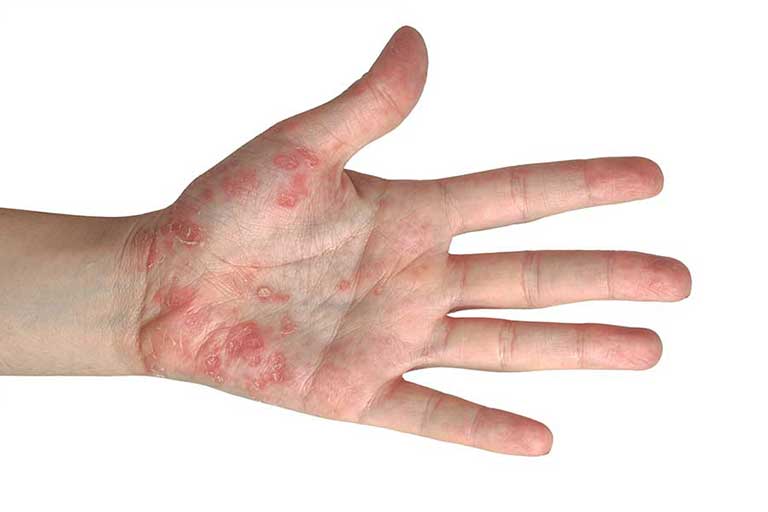Psoriasis: Triggering factors
Psoriasis is a chronic skin disease that causes red, scaly plaques anywhere on the body. It can decrease the quality of life, but there are effective treatments to control it.

Shine a Positive Light
For World Psoriasis Day 2023, we keep bringing up this disease and we #ShineAPositiveLight with the mini-series Nina, which highlights the importance of mental health burdens affecting people living with psoriasis.
The disease can be very debilitating, affecting the physical and emotional wellbeing of patients, and today we are shinning a positive light on this reality.

Triggering factors in psoriasis
The cause of psoriasis is not completely known, although there is evidence of genetic predisposition. Some genes have been found to increase the risk of psoriasis. If you inherit these genes from your parents, you will have a higher likelihood of developing psoriasis than other people who do not have these genes.
Specifically, if one of the parents has psoriasis, the likelihood of their offspring to have the disease is less than 1 in 10. In case both parents have psoriasis, the probability increases to 1 in 3.
However, heredity does not fully explain why psoriasis occurs. There are other factors that also play a role.

What other factors play a role in psoriasis?
Psoriasis risk factors are health and lifestyle related habits which increase the probability of developing psoriasis, especially in individuals with genetic predisposition. Factors that can trigger and exacerbate flare-ups include:
- Tobacco. The risk of onset of psoriasis in smokers is twice that of non-smokers. In addition, it seems that the more quantity and the longer you smoke, the higher the risk.
- Alcohol. As with smoking, alcohol use also seems to play a role in the onset of psoriasis. Furthermore, alcohol increases severity and may decrease treatment efficacy.
- Obesity. Or weight gain has been shown to be an independent risk factor for psoriasis. There are two suspected reasons for this. Firstly, obesity promotes inflammation and, therefore, the onset of psoriasis. Secondly, psoriasis affects mood and can hinder physical activity, all of which favors the development of obesity.
- Infections. Infections can trigger and exacerbate psoriasis. Pharyngitis caused by a bacterium called streptococcus is a typical trigger of guttate psoriasis. Also, the human immunodeficiency virus (HIV) can trigger psoriasis.
- Drugs. Some drugs can trigger psoriasis, for instance, β blockers (used to treat heart disease) and lithium (a drug for bipolar disorder).
- Stress. Stress is associated with both the onset of psoriasis and flare-ups in people previously diagnosed with psoriasis.
- Weather. Skin psoriasis and psoriatic arthritis usually worsen in the winter and improve throughout summer. The National Psoriasis Foundation explains that this is due to air dryness, poor sunlight and cold weather.
- Other skin lesions. Any alteration of the skin―such as scratches, piercings or sunburns―can trigger psoriasis lesions to appear. This is called Koebner's phenomenon.
It is important to remember that none of these risk factors alone is sufficient to cause psoriasis. For example, there are many people with stress who do not have psoriasis. However, if you have psoriasis and you are going through a difficult time, with a lot of stress, you may have a flare-up.
References
- Boehncke, W.H., Schön, M.P. Psoriasis. Lancet [Internet]. 2015;386(9997):983-994. Available at: https://www.ncbi.nlm.nih.gov/pubmed/26025581. doi: 10.1016/S01406736(14)61909-7.
- Swanbeck, G., Inerot, A., Martinsson, T., Enerbäck, C., Enlund, F., Samuelsson, L., et al. Genetic counselling in psoriasis: empirical data on psoriasis among first-degree relatives of 3095 psoriatic probands. Br J Dermatol [Internet]. 1997 Dec;137(6):939-42. Available at: https://www.ncbi.nlm.nih.gov/pubmed/9470911
- European Academy of Dermatology and Venereology (EADV). Psoriasis can be hereditary [Internet]. 2019. Available at: https://www.eadv.org/cms-admin/showfile/9635-EADV%20PSORIASIS-7-Psoriasis%20and%20genetics.pdf
- Kamiya, K., Kishimoto, M., Sugai, J., Komine, M., Ohtsuki, M. Risk Factors for the Development of Psoriasis. Int J Mol Sci [Internet]. 2019 Sep 5;20(18). Available at: https://www.ncbi.nlm.nih.gov/pubmed/31491865. doi: 10.3390/ijms20184347.
- Naldi, L. Psoriasis and smoking: links and risks. Dovepress [Internet]. 2016 May 27;6:6571. Available at: https://www.ncbi.nlm.nih.gov/pmc/articles/PMC5683129/. doi: 10.2147/PTT.S85189.
- National Psoriasis Foundation (NPF). Frequently Asked Questions: Psoriasis in spring, summer, fall and winter [Internet]. 2019 [Cited 2020 Feb 22]. Available at: https://www.psoriasis.org/about-psoriasis/faqs/weather
- Ford, A.R., Siegel, M., Bagel, J., Cordoro, K.M., Garg, A., Gottlieb, A., et al. Dietary Recommendations for Adults With Psoriasis or Psoriatic Arthritis From the Medical Board of the National Psoriasis Foundation: A Systematic Review. JAMA Dermatol [Internet]. 2018;154(8):934-950. Available at: https://www.ncbi.nlm.nih.gov/pubmed/29926091. doi: 10.1001/jamadermatol.2018.1412.
- World Health Organization (WHO). Global report on psoriasis [Internet]. 2016. Available at: https://apps.who.int/iris/handle/10665/204417
- Gibson, L.E. Psoriasis flare-ups: How can I recognize my unique triggers? Mayo Clinic [Internet]. 2019 Jan 03. Available at: https://www.mayoclinic.org/diseasesconditions/psoriasis/expert-answers/psoriasis-flare-ups-how-can-i-recognize-my-uniquetriggers/faq-20380753
- American Academy of Dermatology (AAD). Psoriasis triggers: How to find and manage yours [Internet]. 2020. Available at: https://www.aad.org/public/diseases/psoriasis/triggers

